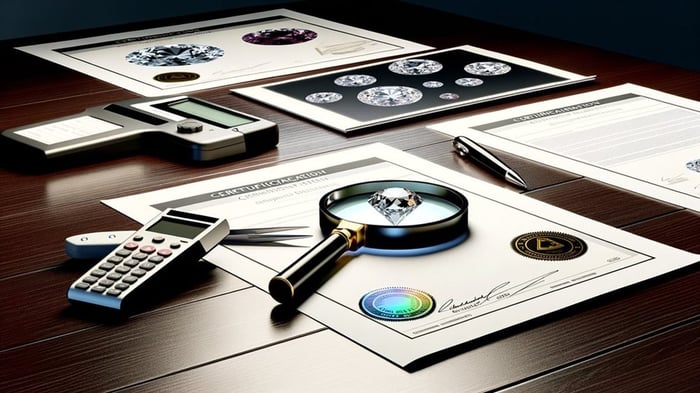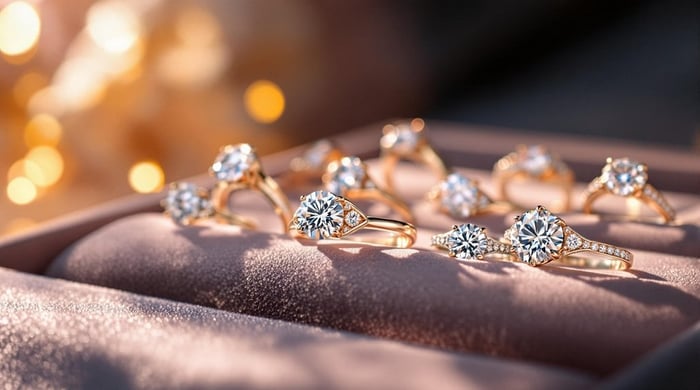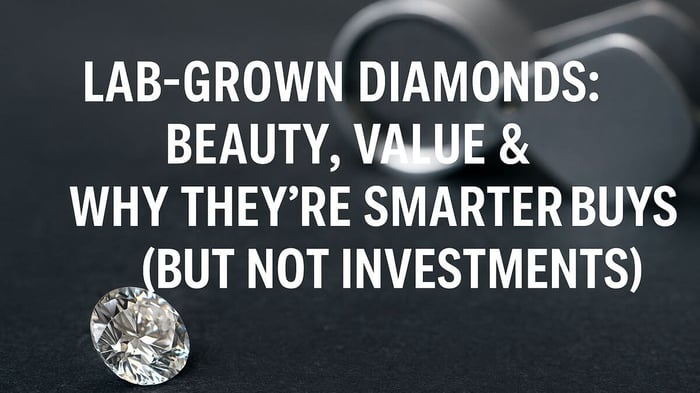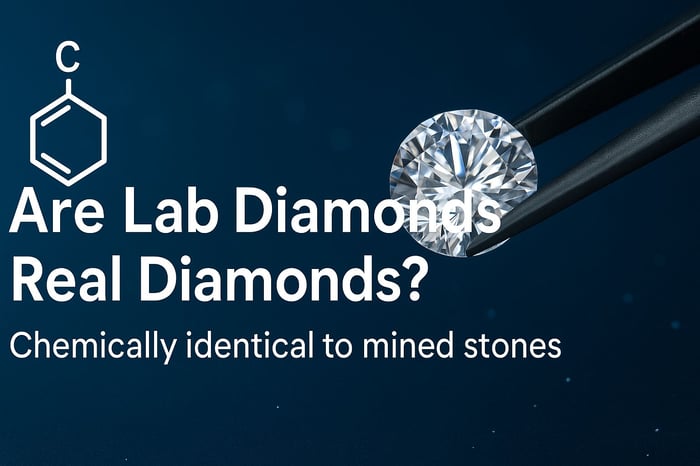In This Article
- Article Summary
- Understanding the Basics of Lab Diamonds
- Comparing the 4Cs: Carat, Colour, Clarity, and Cut
- Evaluating the Price Difference and Value
- Considering the Environmental and Social Impact
- Examining Certification and Marking Reports
- Exploring the Resale Potential and Market Demand
- Assessing Your Personal Preferences and Budget
- Choosing a Reputable Retailer and Making an Informed Decision
- Ready to Compare Lab Diamonds and Find Your Perfect Match?
- References
When you're in the market for a lab diamond, it's essential to compare your alternatives carefully. By understanding the "4Cs"—carat, colour, clarity, and cut— you can make an informed decision that fits your preferences and budget. But there's more to consider than just the diamond itself. To compare lab diamonds and get the best value, you'll need to evaluate factors like certification, resale potential, and the retailer's reputation. So, where should you start?
Article Summary
- Understand the 4Cs (cut, colour, clarity, carat weight) to compare lab diamonds and assess their quality and value.
- Determine your budget and prioritise the 4Cs based on personal preferences and financial considerations.
- Choose a reputable retailer offering certified lab diamonds, transparent sourcing, and excellent customer service.
- Consider the environmental and ethical advantages of lab diamonds over mined diamonds.
- Be aware of the lower resale value of lab diamonds compared to natural diamonds when making your purchase decision.
Understanding the Basics of Lab Diamonds
When exploring the domain of lab-grown diamonds, it's important to understand the basics of these captivating stones. Lab diamonds share the same chemical identity and physical properties as natural diamonds, including their hardness and crystal structure. Lab-grown diamonds are graded using the same "4Cs" criteria as natural diamonds – cut, colour, clarity, and carat weight.
They're grown using advanced production techniques like high-pressure high-temperature (HPHT) or chemical vapour deposition (CVD). The growth process often begins with a natural diamond "seed" and takes days to weeks, depending on the desired size.
Compared to mined diamonds, lab-grown treasures have a lower environmental impact. These sustainable gems are typically 80% less expensive than natural diamonds of comparable quality. Although they may have distinctive inclusions or colour zoning, these characteristics help gemologists identify them.
With careful quality control during production, lab diamonds offer a stunning and ethical substitute to their natural counterparts.
Lab Diamond Channel Set Bangle 3.00ct in D/VVS 9k Rose Gold
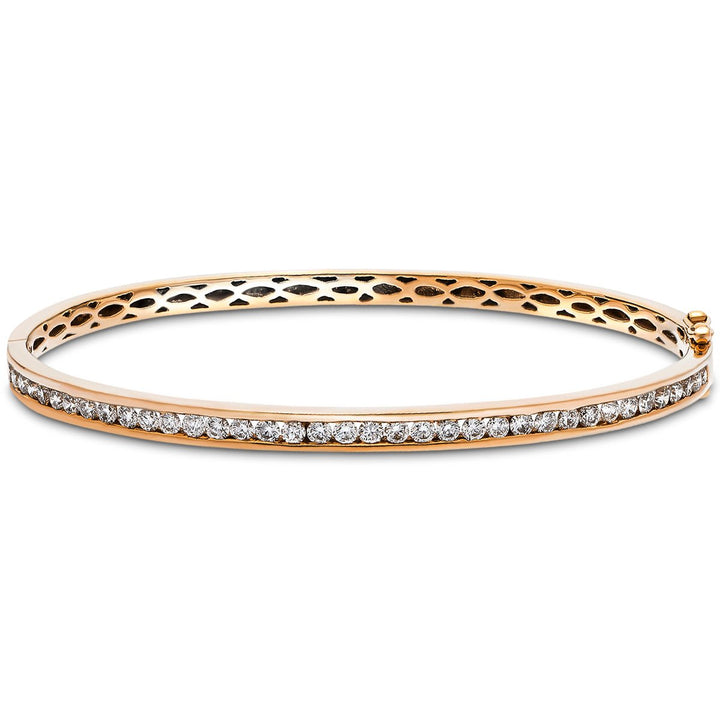
£2,876.00
£6,395.00
Indulge in the epitome of elegance with the Lab Diamond Channel Set Bangle, featuring a stunning 3.00ct of D/VVS quality real diamonds. Each diamond is meticulously placed in a channel setting, showcasing its brilliance and ensuring a smooth finish. This… read more
Comparing the 4Cs: Carat, Colour, Clarity, and Cut
Now that you grasp the fundamentals of lab-grown diamonds, let's compare them using the 4C's: carat, colour, clarity, and cut.
When making carat comparisons, consider that lab diamonds can range widely in size and price, with larger stones typically costing more per carat. Round brilliant diamonds are the most expensive shape, as they require more rough diamond material to create.
Colour significance varies, as laboratories can produce diamonds ranging from colourless to tinted, impacting value based on market preferences. Nitrogen inclusions often cause yellow or brown undertones in lab-grown diamonds. The most sought-after stones fall within the D to H range for optimal colourless appearance.
Clarity levels are graded similarly to natural diamonds, with fewer inclusions being more valuable. While diamond grading and certification are valuable purchasing tools, be aware that certification standards may differ between organisations.
Cut quality is vital, as it affects brilliance and sparkle. A well-cut diamond maximises visual impact, whereas poor cuts can look dull.
Evaluating the Price Difference and Value
As lab-grown diamonds share the same physical properties as natural diamonds, their prices differ significantly.
Recent price trends show 1-carat lab diamonds ranging from £588 to £1,000, whereas natural equivalents cost £4,000 to £9,000. Improved production technology and rising market competition have driven lab prices down 70%–80% since 2020. The global lab-grown diamond market is projected to reach £29.73 billion in 2025.
Although lab diamonds offer more carats and higher quality for your budget, they have lower resale value than natural stones.
Modern HPHT and CVD techniques have revolutionised the quality and accessibility of lab diamond production. Consider your priorities when evaluating overall worth. Lab diamonds have a higher cost-per-carat value, while natural diamonds offer better long-term investment potential.
Factors like cut, colour, clarity, and shape still affect lab diamond pricing, just at a lower baseline than mined diamonds. No mining costs are associated with the production of lab-grown diamonds, contributing to their lower prices compared to natural diamonds.
When you are looking to buy lab-grown diamond jewellery it pays to keep yourself informed on market supply changes that can impact prices in the short term. Such monitoring can range from looking out for sales and special offers to watching out for market trends and global events that might affect diamond pricing.
Lab Solitaire Diamond Bracelet 0.50ct G/VS Quality in 18k Yellow Gold
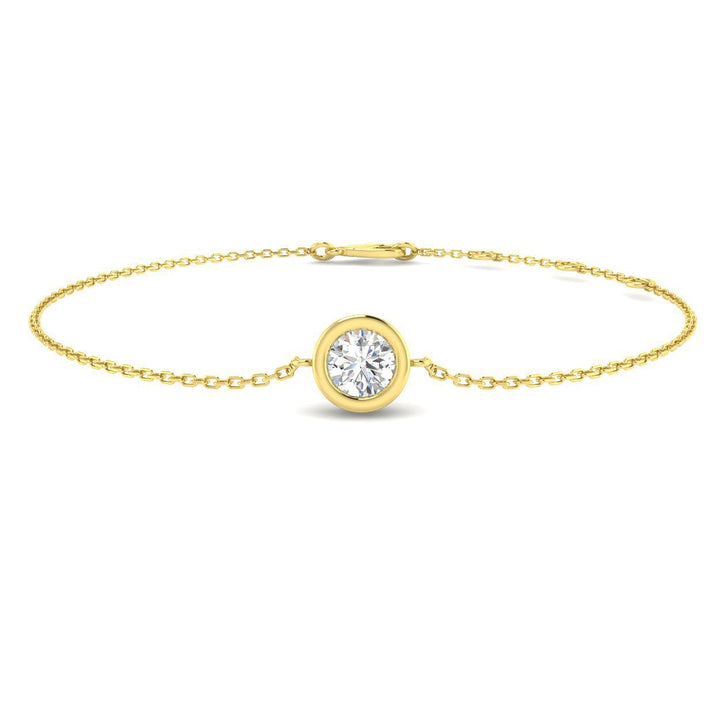
£642.00
£1,151.00
The Lab Solitaire Diamond Bracelet offers a refined touch of luxury with its subtle modern style, featuring a 0.50ct genuine solitaire diamond. This exquisite diamond, measuring 5.0mm, is bezel set into the lustrous 18k yellow gold, showcasing the stone's beauty… read more
Considering the Environmental and Social Impact
In terms of environmental and social impact, lab-grown diamonds offer an eco-friendly alternative to mined diamonds.
Traditional mining practices do not produce the same level of carbon emissions, water usage, and waste generation as lab-grown diamonds. In fact, one carat of lab-grown diamond disrupts only 65 square centimetres of land with just 500 grams of waste, compared to about 9 square metres and 27 tonnes for mined diamonds. Moreover, lab diamond production is becoming increasingly energy-efficient through the use of renewable energy sources.
Additionally, you can feel secure knowing that lab diamonds are conflict-free and avoid the ethical concerns sometimes associated with the diamond mining industry.
Eco-Friendly Choice
Lab-grown diamonds offer a more eco-friendly choice compared to mined diamonds when considering the environmental and social impact. Through sustainable practices and ethical sourcing, lab-grown diamonds consume significantly less water, produce less waste, and emit fewer pollutants during production. Trusted suppliers adhere to SCS-007-Jewellery Sustainability Standards for sourcing diamonds. Lab-grown diamonds minimise harm to natural habitats and ecosystems, unlike mined diamonds, which lead to deforestation and biodiversity loss.
| Environmental Factor | Lab-Grown Diamonds | Mined Diamonds |
|---|---|---|
| Water Usage (gal/ct) | 18 | 126 |
| Waste Generation | Minimal | 4,383 times more |
| Pollutant Emissions | None | Sulphur oxide, etc. |
Lab-grown diamonds also eliminate the labour concerns associated with mining, such as exploitative conditions. Some producers even engage in community development projects and provide detailed information on their production methods, guaranteeing transparency for consumers making informed choices about sustainability.
Lab Diamond Solitaire Stud Bezel Set Earrings 4.00ct D/VVS 18k White Gold
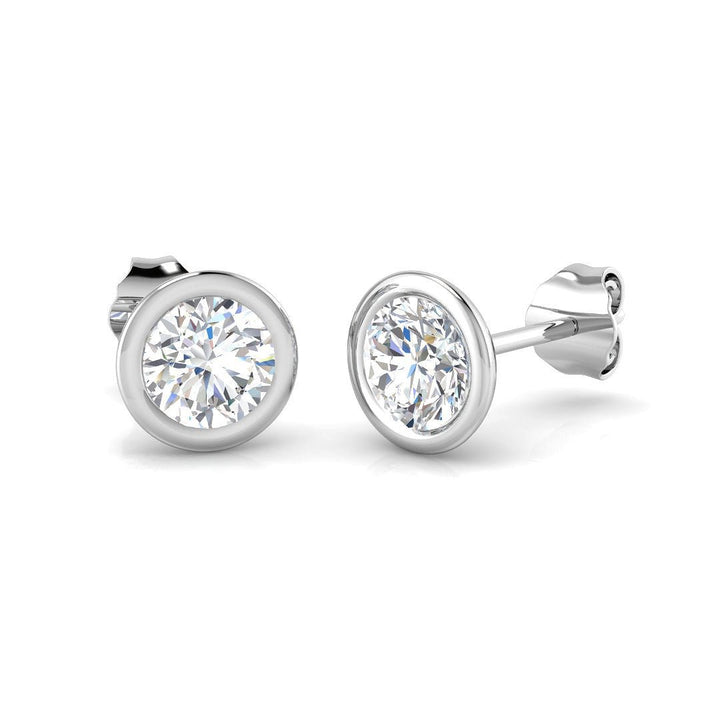
£1,828.00
£3,650.00
Make a statement with our Lab Diamond Solitaire Stud Bezel Set Earrings, featuring a beautiful 4.00 carats total weight of D/VVS-graded lab-grown diamonds. The gemstones are set in 18k white gold. These earrings showcase a solitaire diamond in a bezel… read more
Conflict-Free Diamonds
Conflict-free diamonds offer consumers a conscientious choice that avoids financing armed violence and human rights abuses.
Ethical sourcing ensures that diamonds originate from mines that comply with strict labour and environmental standards. Traceability through the Kimberley Process Certification Scheme helps track diamonds from mine to market, even though the complex supply chain poses challenges. Artisanal mining accounts for around 15% of global diamond production, raising concerns over potential exploitation and unsafe conditions. Recycled diamonds offer an eco-friendly alternative, as they have minimal environmental impact and do not contribute to new mining operations.
When shopping for a lab diamond, ask about its ethical and eco-friendly origins. Reputable sellers provide transparent information on a stone's provenance.
Opting for a certified conflict-free diamond supports responsible mining practices and peacekeeping efforts in producing countries.
Examining Certification and Marking Reports
As you investigate the domain of lab-grown diamonds, comprehending certification and grading reports is crucial. Familiarise yourself with the various certificate types, such as GIA, IGI, and GCAL. Each lab assesses the 4Cs—cut, colour, clarity, and carat weight—using standard grading scales. Grading processes can differ among certification bodies, so it's important to understand the nuances between various lab reports. The AGS Ideal Report accompanies GIA reports for lab-grown diamonds, providing a detailed analysis of the diamond's light performance.
While GIA is known for its stringency, IGI offers more affordable certification. GCAL stands out with its light performance analysis. Eventually, the report you choose depends on your priorities and budget.
A credible certification guarantees transparency about the diamond's characteristics and value. It instills confidence in the authenticity and quality of your purchases.
Opting for a reputable lab with global recognition can likewise boost the diamond's resale potential. So, carefully consider the certification when comparing lab-grown diamonds to make an informed decision.
Mens Lab Diamond Ridged Edge Signet Ring 0.08ct D/VVS in 9k Yellow Gold
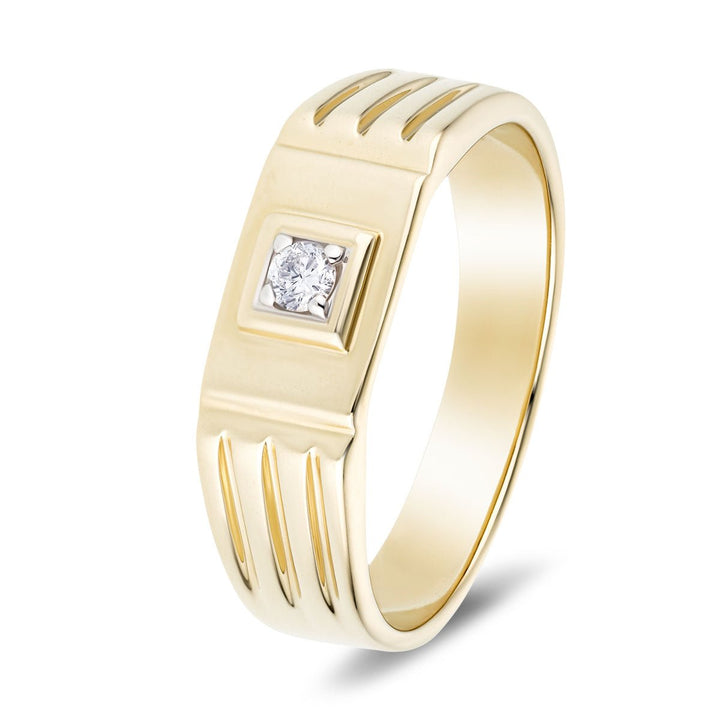
£603.00
£895.00
Introducing the Men's Lab Diamond Ridged Edge Signet Ring, a masterpiece of masculine elegance and striking design. This distinguished ring features a real 0.08ct D/VVS quality diamond, meticulously set in a claw setting that highlights its brilliance. Crafted from lustrous… read more
Exploring the Resale Potential and Market Demand
When you're considering a lab-grown diamond, it's important to understand the resale potential.
You may be attracted to the lower upfront cost, but lab diamonds can be challenging to resell and typically fetch much lower prices than natural diamonds. Market saturation presents challenges for existing brands and may further impact resale values. Sales of lab-grown diamond jewellery increased by 51% in 2024, indicating strong consumer interest, despite potential reselling challenges.
Nevertheless, market demand for these stones is growing, driven by factors like sustainability and affordability.
Limited Resale Value
Even though lab-grown diamonds offer an appealing, cost-effective alternative to natural diamonds, their resale value is significantly lower.
When considering resale expectations, it's vital to understand that lab diamonds typically resell for only 30 to 40% of their original price. This price depreciation is particularly steeper than what natural diamonds experience. Public perception favours natural diamonds because of their perceived rarity and sentimental value, further impacting their resale potential. Because lab-grown diamonds are virtually indistinguishable from natural diamonds, even for trained gemologists, reselling all diamond types is becoming more challenging.
Several factors contribute to the limited resale potential of lab-grown diamonds:
- Market saturation because of increasing availability
- Ongoing technological advancements that make lab diamonds more affordable
- The developing nature of the resale market for these stones
While lab-grown diamonds provide an attractive substitute for initial purchase, it's important to temper your resale expectations.
If retaining value over time is a priority, natural diamonds may be a more suitable choice.
Challenging Resale Process
Reselling lab-grown diamonds can be a challenging process due to various market factors and consumer perceptions. The resale market for lab diamonds is less active compared to natural diamonds, partly due to the perception that lab-grown stones are less rare and valuable. Technological advancements also contribute to declining resale prices over time.
Resellers, even today, often lack familiarity with lab-grown diamonds, which can lead to uncertainty about their value and market demand, resulting in lower resale offers. The falling prices of cultured diamonds due to increased supply and decreased demand further complicate the resale process.
| Resale Challenges | Market Perception |
|---|---|
| Lower demand | Preference for natural diamonds |
| Technological obsolescence | Perceived lack of rarity |
| Immediate depreciation | Traditional value of natural stones |
| Overpricing at initial purchase | Association with advanced technology |
| Depreciation upon wear | Ethical and environmental appeal |
To maximise resale potential, focus on high-quality certified lab diamonds and target environmentally conscious buyers. Adjust prices based on market conditions and highlight the ethical benefits of lab-grown stones.
Ella Lab Diamond Solitaire Engagement Ring 3.00ct G/VS 18k White Gold
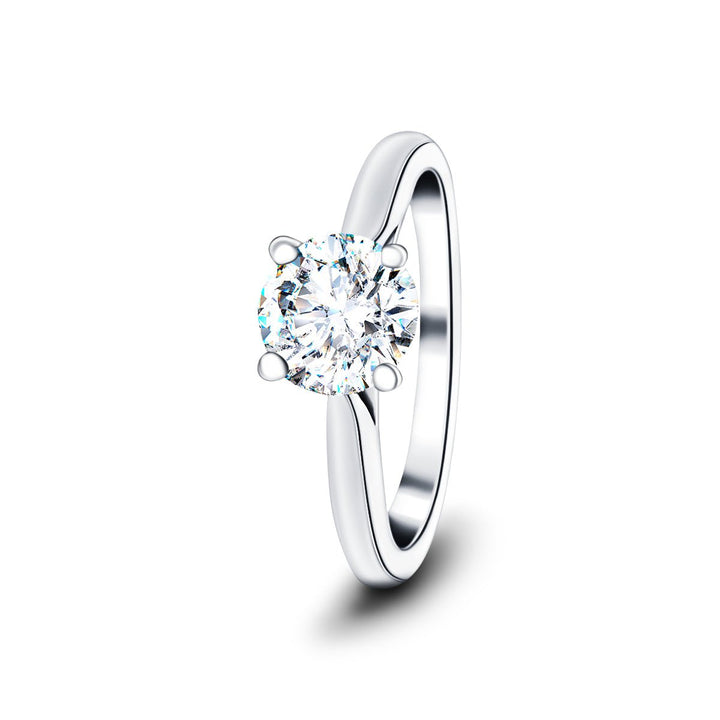
£1,945.00
£5,621.00
Celebrate your love with the captivating Ella Lab Diamond Solitaire Engagement Ring, a true masterpiece of craftsmanship. This ring features a stunning 3.00-carat G/VS lab-grown round solitaire diamond set in 18k white gold. Certified by IGI, hallmarked in the UK,… read more
Growing Market Demand
The lab-grown diamond market is experiencing significant growth, driven by increasing consumer demand for affordable, ethically sourced, and environmentally friendly alternatives to mined diamonds.
As consumer trends shift towards sustainability and cost-effectiveness, the market size is projected to reach an impressive £29.73 billion by 2025. Despite a recent slowdown, sales neared £9 billion in 2024, showcasing the market's growth potential. Evolving pricing dynamics necessitate adaptation in selling strategies to remain competitive in the market.
Factors such as technological advancements, improved consumer perception, and a focus on eco-friendly choices continue to fuel market growth.
Nevertheless, as the competitive environment intensifies, you can expect price fluctuations and stabilisation as production technologies improve.
When considering a lab-grown diamond purchase, it's essential to stay informed about these market dynamics to make the best decision for your budget and values.
Assessing Your Personal Preferences and Budget
When assessing your personal preferences and budget for a lab diamond, you'll want to contemplate several key factors. Your personal style will influence the shape, setting, and overall look you desire. Consider what aesthetics resonate with you most. Lab diamonds enable purchasing multiple shapes due to their affordability compared to natural diamonds. Lab-grown diamonds come in various carat weights, allowing you to find the perfect size to suit your preferences and budget.
Furthermore, examine your financial priorities to determine an appropriate budget range. Factor in:
- The 4Cs and which of the attributes matter most to you
- Allocating funds to prioritise your preferred attributes
- Selecting a shape and cut that fits your style and budget
Seek a balance between your dream diamond and fiscal responsibility. Don't stretch yourself too thin, but don't compromise on the elements that are most meaningful to you.
With some reflection and research, you'll be able to find the ideal lab diamond to cherish.
Choosing a Reputable Retailer and Making an Informed Decision
Now that you've defined your style preferences and budget, your next step is finding a trustworthy retailer. Look for retailers with a solid reputation for transparency, customer service, and a wide selection of certified lab-grown diamonds.
Consider these factors when choosing a retailer:
- Detailed information on diamond costs and creation processes
- Certification by GIA or IGI for quality assurance
- Personalised customer service with virtual and in-person alternatives
- Flexible return policies for peace of mind
- Home try-on programmes to increase customer confidence in their purchase
- High-definition 360° photographs for a comprehensive view of the diamond's quality and characteristics
By shopping with a reputable retailer, you'll have confidence in the quality and value of your lab-grown diamond purchase.
Take your time, compare alternatives, and make an informed decision you'll cherish for years to come.
Lab Diamond 11 Stone Half Eternity Ring 0.40ct G/VS in 9k Rose Gold
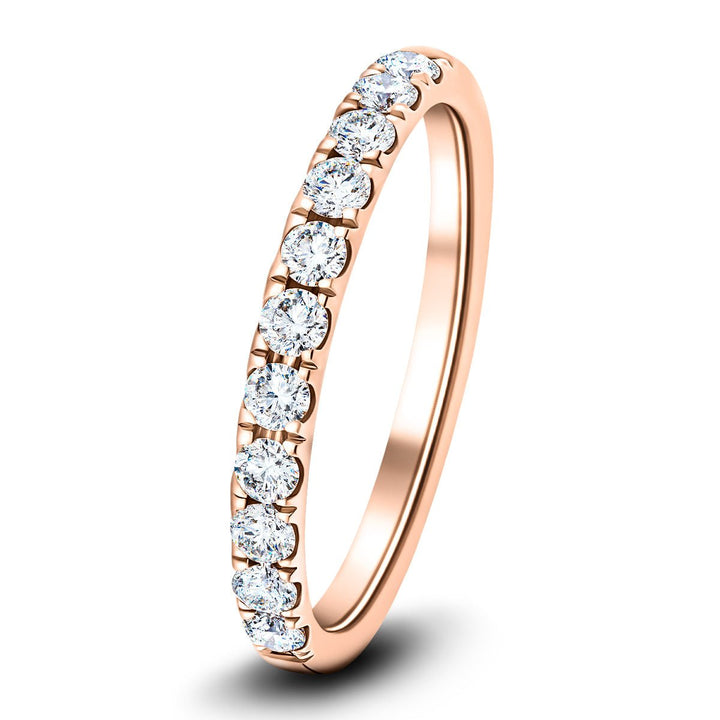
£328.00
£655.00
The Lab Diamond 11 Stone Half Eternity Ring is elegant and delicate, featuring 0.40ct of G/VS quality lab diamonds meticulously set in a classic claw setting for maximum brilliance. Crafted from lustrous 9k rose gold, this ring showcases a 2.4mm… read more
Ready to Compare Lab Diamonds and Find Your Perfect Match?
Now that you're equipped with the knowledge to shop smart, why not put your insights into action?
At After Diamonds, we make it easy to compare lab diamonds and explore a wide selection of stunning lab-grown diamond jewellery. Every piece in our collection is designed in the UK and handcrafted by skilled British artisans, ensuring exceptional quality and timeless style.
With a 30-day try-at-home policy, you can experience your jewellery in the comfort of your own home before making a final decision. Plus, every purchase comes with a lifetime workmanship guarantee—our commitment to the craftsmanship that sets us apart.
Discover your perfect piece today at After Diamonds and shop with complete confidence.
20ct Lab Diamond Tennis Necklace D/VVS Quality in 18k White Gold
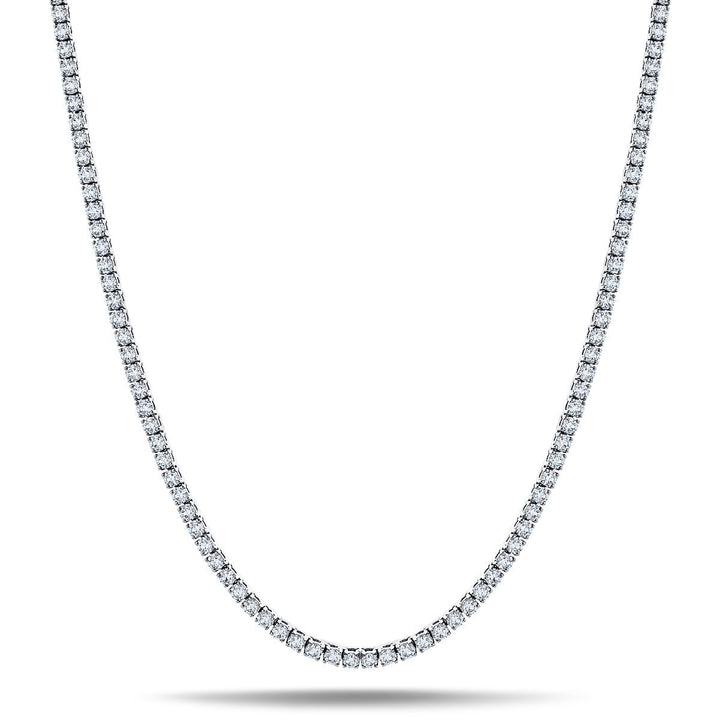
£8,874.00
£16,700.00
Embrace the timeless appeal of yellow gold with this tennis necklace featuring 20ct of lab-grown D/VVS quality diamonds. Set in 18k white gold, this UK handcrafted, and hallmarked piece exudes a warm and luxurious glow. The 17" necklace provides the… read more
References
- https://www.brides.com/lab-grown-vs-natural-diamonds-what-s-the-difference-5216790
- https://hiholden.com/blogs/all/what-are-lab-grown-diamonds
- https://4cs.gia.edu/en-us/simulants-moissanite-and-lab-grown-diamonds/
- https://discover.gia.edu/GIALGDR.html
- https://www.sunnyeden.com/education/the-five-cs-of-lab-grown-diamonds
- https://www.pricescope.com/blog/lab-grown-diamond-prices-march-2025
- https://www.youtube.com/watch?v=UZUM78TBB9I
- https://abcnews.go.com/Business/lab-grown-diamonds-sustainable-advertised/story?id=109046877


